Healthy Baby Food in Nigeria with Latifat Okara
- How overreliance on pap in Nigeria contributes to malnutrition - and how Latifat helped her daughter thrive with more nutritious local foods
- Which other nutrient-dense weaning options Latifat and her team began to explore that babies can actually eat (...including crayfish!)
- How cultural beliefs, religious practices and seasonal food availability shape infant feeding practices in Nigeria
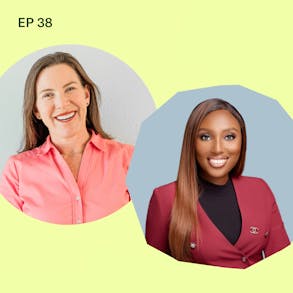
LISTEN TO THIS EPISODE
Episode Description
In Nigeria, babies are traditionally weaned using a food called pap. It’s a cornmeal mixed with water type of cereal that will certainly fill a baby up, but a dish that lacks important nutrients that babies need for adequate growth and development.
Latifat Okara is working to change this. Through her company Nomnom Babies, Latifat is helping to educate primary care providers and parents about the wider array of wholesome foods that babies CAN and SHOULD be eating when starting solid foods.

About the Guest
- Latifat is the Principal for Health Policy and Insights for the Americas at Economist Impact. She collaborates with a multidisciplinary team to lead and deliver high-quality, evidence-based research and health policy analysis initiatives that span the global health ecosystem's public and private sectors.
- Latifat has diverse experience in health policy and systems, working in Africa, South Asia, and the Pacific Island regions in projects that combine technical research, systems thinking, organizational strategy, and high-level stakeholder engagements on multi-level health initiatives designed to improve population-level impact.
- Latifat is recognized for her authorship and contribution to impactful publications in the British Medical Journal. Latifat's accomplishments have earned her recognition, including being named in the New York City Daily as a Boston Congress of Public Health 40 under 40 Winner. Latifat holds a Master of Public Health degree from Harvard T.H. Chan School of Public Health and is a Doctor of Public Health candidate in Health Policy and Leadership at Loma Linda.

Links from this Episode
- Helping Babies Get a Nutritious Start in Life - article about Latifat Okara’s work from the Harvard T.H. Chan School of Public Health
- Nomnom Babies - Latifat’s infant weaning Instagram page @nomnom_babies
- Baby-Led Weaning with Katie Ferraro program with the 100 First Foods™ Daily Meal Plan, join here: https://babyledweaning.co/program
- Baby-Led Weaning with Katie Ferraro program with the 100 First Foods™ Daily Meal Plan, join here: https://babyledweaning.co/program
- Baby-Led Weaning for Beginners free online workshop with 100 First Foods™ list to all attendees, register here: https://babyledweaning.co/baby-led-weaning-for-beginners
Other Episodes Related to this Topic
- Episode 149 - Pouches: Why Your Baby Doesn't Need to Suck Pureed Food Out of Pouches with @msdawnslp Dawn Winkelmann, MS, CCC-SLP
- Episode 316 - Taste Preferences in Babies: When and How do They Develop? with Alison Ventura, PhD
- Episode 410 - Empowering Black and African American Breastfeeding Families with @cinnamoms_ Toncé Jackson, EdD, MPH, RDN, CLE

Latest Episodes
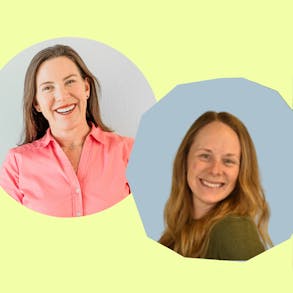
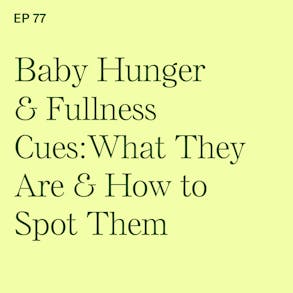
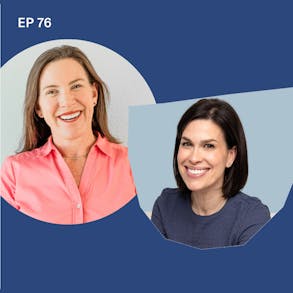
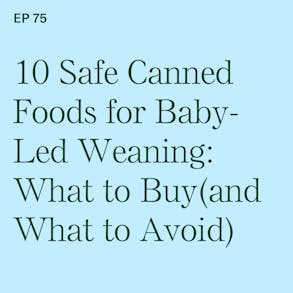
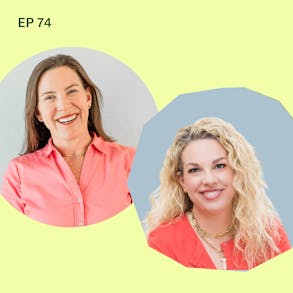
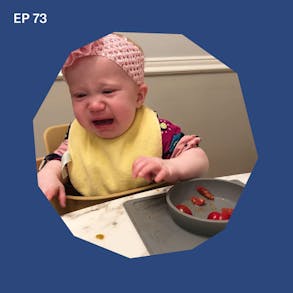
Latifat Okara (2s):
Four months down the line, I came back and my daughter was now 11, 12 months old. I noticed that hadn't grown as much as her first, as her older sister. And then I started to probe into what was she eating, what were the gaps, right? I realized that she maintained her weight for the time I left until the time I came back, and that experience just broke me.
Katie Ferraro (23s):
Hey there, I'm Katie Ferraro, registered dietitian, college nutrition professor and mom of seven specializing in baby-led weaning here on the Baby-Led Weaning with Katie Ferraro podcast. I help you strip out all of the noise and nonsense about feeding, giving you the confidence and knowledge You need to give your baby a safe start to solid foods using baby-led weaning. Hello and welcome back. Today's episode is a little bit different and I am gonna be sharing a very powerful conversation with Latifat Okara. She's a public health nutritionist. She's the founder of Nomnom Babies. Now Latifat is originally from Nigeria.
Katie Ferraro (1m 3s):
She has dedicated her work to improving the way that babies are introduced to solid foods, particularly in underserved communities where traditional weaning practices may rely on heavily starchy carbohydrate foods. In the case of Nigeria, she's gonna be talking about a maze based cereal called pap. And while Pap is widely used, it's also low in essential nutrients. So Latifat has made it her mission to educate families and healthcare providers about more nourishing and locally available options. So since we first connected on this interview, I followed up with Latifat to get an update. Nomnom babies has expanded its community outreach across Nigeria. They started manufacturing foods that are made from local ingredients and distributing them for free in health centers in order to support healthy weaning.
Katie Ferraro (1m 48s):
Latifat is also completing her doctoral thesis in nutrition policy, which like props to anybody doing any sort of work with their brain after they have children. I don know how she does this, but her work focuses on how Nigeria can improve complementary feeding through multi-sectoral strategies. So she's now based in Washington DC where she's working to expand Nomnom babies into the US market with a focus on culturally relevant and affordable weeding options. So I think that you'll find Latifat's message is incredibly inspiring. It's that babies around the world deserve better than just high carb filler foods. They deserve to learn how to eat real food, nutrient dense, accessible, and food that are aligned with their family's food cultures.
Katie Ferraro (2m 29s):
So with no further ado, I wanna introduce you to Latifat Okara who's talking about healthy baby food in both Nigeria and now her efforts in the United States.
Latifat Okara (2m 41s):
Hi Katie. I'm so happy to be here. Thanks for having me.
Katie Ferraro (2m 44s):
You have a very interesting history in nutrition, how you personally became involved and what you've been doing from a, a research and a business standpoint. I'm so excited to share your story with our audience and I was wondering if you could just tell us how did you become interested in feeding babies?
Latifat Okara (3m 2s):
There are different approaches to look at it. So the first is when I started weaning my first daughter and she was turning six months and I needed to get ready to start feeding her complimentary foods. So I went to the stores and wasn't impressed by the process, the amount of processed foods I found on the shelf. So at that point I realized that I needed to, I started doing some research around recipes, what nutrients she needed for her growing body. I was fortunate enough to already knew, to already know that nutrition from a very early age has a lot to do with, has a lot of influence on a child's cognitive behaviors, emotional health and all of that.
Latifat Okara (3m 43s):
So I started researching re recipes and invested some time and effort in making her foods myself. So I started doing, I started her own fruit vegetables and fruit and animal protein purees. And that inspired me to just, in doing that work and seeing how my child was growing, how getting the right nutrients, I got inspired to start a nutrition education company and an online community called Phenomenon Babies. So however, I, while I was doing all of that, I started also speaking to some mothers. I started getting some questions from some others who had similar concerns and needed to feed their kids healthy food as well. So I knew at that point that, okay, you know what, why don't I just go into, go and learn, get some more education around the concept of public health nutrition specifically.
Latifat Okara (4m 31s):
And that was when I moved to Harvard. However, my move to Harvard meant that I had to leave my second daughter now who was eight months old in Nigeria with my family, who unfortunately didn't have so much knowledge about the importance of infant nutrition. And that experience kind of made, confirmed the reason why I was doing what I was doing was doing. So I, four months down the line, I came back and my daughter was now about 12 months old, 11, 12 months old. And I noticed that she hadn't grown as much as her first, as her older sister. And then I started to probe into, okay, what, what was she eating? What was the what? What were the gaps?
Latifat Okara (5m 12s):
Right? And then I realized that she, while I had the resources to provide her good food, my caregivers didn't have the knowledge and the importance of nutrition on how to combine these foods on what food she needed to be eating. So she maintained her weight for the, for the time I left until the time I came back. And that experience just broke me.
Katie Ferraro (5m 32s):
Whoa. So, so you were gone for four months at Harvard?
Latifat Okara (5m 35s):
Yes.
Katie Ferraro (5m 36s):
You left when your daughter was eight months and when you came back, you're saying she had gained almost no weight over four months.
Latifat Okara (5m 42s):
Yeah, she had gained no weight.
Katie Ferraro (5m 43s):
Wow. So what did you end up doing then? I mean, that would be such a frightening situation.
Latifat Okara (5m 47s):
Yeah, it was. It was heartbreaking, Katie, I must say. And what I did was to educate because I knew I had to go back to school. I had started this course, I just knew I needed to finish. So what I did was to now I educated my caregivers, my mother-in-law, my husband, everybody knew how to make baby food. I mean, they knew the importance of making baby food. I just knew I had to start delegating at that time. So I started out off on Iron Rich Purees. I started her off on how we can started her off on Iron rich purees, big other kind of baby foods like the using our staple foods also to do finger foods, making sure that she eats herself one egg a day, just based iron meat fish in her food and just building her unity, building her weight.
Latifat Okara (6m 39s):
And she improved and she looked better. She looked happier as well. And so when I got back, I would always ask, okay, what is she eating today? I grew up a timetable as well. Made sure that she always had the right food to eat at every point in time, in the right amount and the number of the frequency of eating. So yeah, so that was, that was what I did. And, and so that's basically my story and how I became interested. And now I'm even more interested because I've seen the good side in where I was being, I was available to provide the right food for my first child. And then for the second one, how I had to also use the opportunity and turn it into something like a learning curve for me on how to improve nutrition for kids.
Latifat Okara (7m 22s):
So for me, this was like, I have the resources, this is how I feel about, and yet I couldn't even, my second child had that deficiency. I want to help other models avoid this compromise. And so I started investing more in Nomnom babies, providing the education out there and the nutrition education that mother actually need.
Katie Ferraro (7m 42s):
Hey, we're gonna take a quick break, but I'll be right back. So you mentioned traditional staple foods in Nigeria and before we started recording, we were chatting, you were telling me about pap and I was wondering if you could explain to our listeners what do parents traditionally feed babies in Nigeria and at what age do they start the weaning process?
Latifat Okara (8m 12s):
I would say majority of the mother that I've spoken to, and even the mother that have met in primary healthcare centers, because one of the initiatives of Nomnom babies is to work with mother in underserved populations through primary healthcare centers to provide them with the education, nutrition, education that they need. And also, I kind of use that as an opportunity to provide models with free purees that I make healthy fruit and fresh purees and just provide the, provide it to mother in underserved populations for free. So what I have noticed from my interaction with them is that they usually start off weaning their babies at about five months old or six months for most of them.
Latifat Okara (8m 54s):
But majorly majority of them start at five months old. And they give these, there's this, the staple food called pap pap is made of maze, right? Which is a very high carbohydrate food. So what it does is that it fills your child up. What's your child isn't really getting all the nutrients that he or she needs to grow, right? So, and that's kind of, that was really, really common from my conversation with most of the, the mothers that I met. And that's one common staple food, that common staple cereal that is affordable and it's very accessible as well to most mothers when they're starting to feed their kids. The interesting thing about pap is that I have never seen any child that has refused pap.
Latifat Okara (9m 39s):
So it's very easy for mothers to turn to consuming pap as a staple food for a child. But again, nutrition deficiencies when you are only relying on pap.
Katie Ferraro (9m 50s):
So if the pap is, I guess we would call it corn meal, what is it mixed with? Is it made into like a, a gruel or a soup or is serve it's wetter, is that correct?
Latifat Okara (10m 1s):
It's actually made in a way that you buy, it solidified and then you kind of melt it with some water and then add hot water to it. So it becomes like a porridge
Katie Ferraro (10m 14s):
And it's pure carbohydrate, basically there's, there's not really any protein. There's no fat,
Latifat Okara (10m 18s):
Yeah, there's pure Carbohydrate.
Katie Ferraro (10m 19s):
There's definitely no iron. Okay.
Latifat Okara (10m 20s):
No, no, no. It it's pure carbohydrate. Yeah. If pure carbohydrate, so some mother add can add maybe crayfish or protein and then add the baby's milk to it. But most of the times you can just add your baby's milk to it. But the, the base is carbohydrates, it's just really pure corn milk.
Katie Ferraro (10m 37s):
And I like what you said, which was no child has refused it because carbohydrates are slightly on the sweeter side. It's easy to feed and then of course it fills you up as high carbohydrate foods will, so the baby feels full and stops eating yet unfortunately it doesn't contain the entirety of the nutrients that the babies need for adequate growth. And you saw that with your, your daughter. So can I ask you, with your education component of Nomnom babies, knowing that the base of the traditional foods there would be very high in carbohydrate, what sort of local foods are available that would have a more appropriate nutrient mix? Like what kind of foods can you recommend to the moms to feed that they can easily get?
Latifat Okara (11m 20s):
Yeah, so there, there are a number, there are a lot of Nigerian meals that moms can use. But again, education awareness really matters on how you can modify that recipe to become a baby friendly meal. Right? So some of them that I can easily lay my hands on right now is plantain. So plantain is common. It's very accessible in the market on the streets, right? So plantains are high in vitamin A, high in vitamin C, high in potassium. And that can become, that can replace the amount of time you give your child pop for example. So how I make for a, for a baby who is who, you're starting off as a complimentary food and if you want to do the purees, you can actually eat blend plantains, egg yolk, right?
Latifat Okara (12m 6s):
That is a very good recipe that my daughter has never refused. So other ways that it can be done plantains with green peas, it can also be fried as good finger foods for babies. It can be made as plantain chips, right? For older kids or toddlers as finger foods and just leave it there. The baby feeds herself for himself with that food. It's a good baby-led weaning recipe. And that's a local staple. Another one is that is not carbohydrate is akara is made out of beans, right? So blended beans and fried, blended and fried beans is called akara. It's a snack and it's healthy and it's can be used as a snack.
Latifat Okara (12m 50s):
It can be used as a main main meal for, for a child who is maybe starting off trying to learn how to chew, how to feed himself, pizza, grape, I mean these are some, some staples that can also replace the traditional corn based meal.
Katie Ferraro (13m 7s):
Okay. Can I ask you about the AKARA when we say beans in the us, like I think, okay, green beans, which are a vegetable or legumes, which are like a dried bean, is that what you're talking of? The higher an iron?
Latifat Okara (13m 19s):
Yes, yes. Legumes, dried beans.
Katie Ferraro (13m 21s):
And then the AKARA you, if you dry the beans, like do you soak them and then cook them and then
Latifat Okara (13m 26s):
Yes, Exactly. You soak them and they become soft enough, then you can blend them, right? You can blend them, add your crayfish, which is great in protein, right? Add your crayfish, add some salt and fry, fry the the paste. So you blend it and it becomes a paste thick enough to be fried, not watery for pancake or something like that, but thick enough to be fried in vegetable oil. And that can be a good snack for an older kid.
Katie Ferraro (13m 56s):
Oh, that's amazing. And so you've, you're getting some iron from the beans, you're getting protein and other minerals from the crayfish. That's fabulous.
Latifat Okara (14m 4s):
Yes.
Katie Ferraro (14m 5s):
So I'm interested to know also about the use of nuts or peanuts in the weaning diet in Nigeria. Here in the US we look at the research that shows, okay, earlier introduction particularly of peanuts helps prevent peanut allergy down the road are peanuts or nuts, something that are typically included in the weaning diet in Nigeria.
Latifat Okara (14m 26s):
I personally introduced nuts to my kids from very early stage and I did that by blending ground nuts peanuts and including it in oats. When I make their oats I include maybe a spoon of ground nuts and that that was how I introduced them to nuts from eight months old but early as eight months old. And they do not have any peanut allergies.
Katie Ferraro (14m 50s):
So Latifat, can you tell me a little bit about your own personal experiences starting solids as a child and how that kind of set the stage for your later interest in public health nutrition?
Latifat Okara (15m 2s):
So I was told right by my grandparents, 'cause I was raised by my grandparents and I was told, I was very, they called it that I, they called me that I'm very selective with food and that's what we'll term as a fuzzy eater right now, like in today's age. So I was very selective with food. I wouldn't eat and I would, I was always falling ill. And so that was a big challenge for my grandparents then. And so I grew up in Nigeria and one of the things that was very common is the use of traditional medicine as a way to heal or cure sicknesses that or cure children that you feel that okay, they are always falling ill, right?
Latifat Okara (15m 44s):
So, and by doing that though normally maybe have like facial clarifications for that child. So I had that facial clarification as a child and that was how I started asking the question about what happened, why was my face clarified with with Max. And so the answer was that, oh, you used to always fall sick as a child. You never liked to eat, you would always select your food. And so that was why we resolved to this method to make you better and to make you feel better. So anyway, growing up I just didn't like that part of my story. So I decided to use that as a way to, I to be determined that you know what, I'm going to make a difference with my own children.
Latifat Okara (16m 24s):
I wouldn't term them as being for eaters. I would find ways to make sure that they're eating better rather than resolving to methods that might affect their self-esteem or self image later on in life.
Katie Ferraro (16m 36s):
Is facial scarification still a common practice in parts of Nigeria for picky eaters?
Latifat Okara (16m 41s):
I really don't know if it's still very common, but I don't think so. Now facial clarifications are done for, for several reasons. In some parts of Nigeria it is done as a way to identify that child as being part of a setting culture, right? So it's common within some culture. So if you're in from a particular place, you would always have facial clarifications regardless of the fact that you were ill or not. So in some other places it was a way, it was facial clarification was done as a means of treatment. So in my case it was done as a means of treatment
Katie Ferraro (17m 12s):
In researching the work that you are doing, I came across a quotation where you said that it's important to understand how drivers like racial discrimination, cultural beliefs, poverty and maternal education determine food choices and preference for families around the world. I was curious if you had any insight on how we can dismantle these drivers, racial discrimination, cultural beliefs, et cetera, as it applies to feeding our kids or allowing the kids to learn how to feed themselves. Any thoughts there?
Latifat Okara (17m 44s):
One of the key things that we can do to dismantle those kind of barriers is providing the information out there on learning what we were used to and relearning new approaches on how to give children control. If we're able to do that, then we can advocate more on how kids can take control of their food. People, children can have good relationship with food and become adventurous. They can explore with their food and that would eliminate the barriers of cultural beliefs. On the other hand, maternal education, there have also been studies that show that children that as much as we can have a good food pro product, which is one of the experience that I had when I wanted to, when I started Nomnom babies, providing the food wasn't just enough.
Latifat Okara (18m 28s):
Mothers needs, mothers, fathers or the caregivers, whoever is in charge of taking care of that child and making sure that child eats the right food needs to be aware of what would the child needs. So that's where maternal education, so again on learning, relearning, putting the information out there, just keep doing what we're doing, making sure we're reaching as much people that we can would gradually dismantle these drivers of these drivers that, that are barriers that seem like barriers to, to help optimal nutrition for children.
Katie Ferraro (19m 1s):
And I love the way that you say unlearning and relearning because one thing that I'm always so impressed with is parents who will say, gosh, my baby can eat so many more foods than I give them credit for. And your story has the same underpinnings you say, usually they're just having a maze, the pap, which is just carbohydrate. And here you are showing people, gosh, this is how you can incorporate crayfish and beans and egg yolk and all these different foods that we, sometimes we just assume a baby can't eat it because yeah, we've never seen otherwise or we've been told that, or it's been passed down from generation to generation. So I love that the message that we're both sharing globally is, no, your baby can do so much more than we give them credit for.
Latifat Okara (19m 46s):
That's true.
Katie Ferraro (19m 47s):
Can you talk a little bit about food access in Nigeria, because of course it's wonderful to feed your baby high protein foods and iron foods and fruits and vegetables, but what are the real issues about access in the communities that you're working in?
Latifat Okara (20m 1s):
So as much as we talk about proteins, your child needs iron, your child needs this and your child needs that. Well, Nigeria is to characterize by high reliance on food imports and that's just the way it's right now. So and, and that's malnutrition is a widespread issue in the entire country, especially in the rural areas. And that puts people in vulnerable positions of chronic food shortages. And so there's just really an imbalance because of the total lack of food supply. And that's also because it's highly reliant on food imports. So that's, food access in Nigeria is still very reliant on food imports.
Latifat Okara (20m 44s):
It's not as accessible as it should be, even when it is accessible, the healthy food options are expensive. And that's how the food system is currently and is, it's a challenge in itself on how we can go past that and make healthy foods available. Unlike in the US where we have, where a number of places there has been policy advocacy that has led places to have local farmers markets that make healthy food options cheaper and more available. We do not have that in most part of the developing world. Right. And in rural areas specifically. So that's, that's a challenge in itself.
Katie Ferraro (21m 22s):
Hey, we're gonna take a quick break, but I'll be right back. Can you talk a little bit about traditional staple Nigerian meals that could possibly be modified for baby-led weaning? Because as you mentioned, there is a reliance on food import, there are issues of chronic food shortages. So what can parents in Nigeria do to make the foods that they do have access to more nutritious and more appropriate to promote the baby's growth?
Latifat Okara (21m 57s):
Yeah, so like I was, like I mentioned before, some of the foods like plantains can be made as plantain is a staple food, yam is carbohydrate, but it's also a staple food that can be tweaked in so many ways. Boiled, fried can be used as a way to introduce baby-led weaning for kids. And then also beans can be made into akara as a snack. That's a good baby-led weaning food that would increase that things are great that would kind of teach children things are great, foster independence, chewing and so on. There's also another snack that's made out of Flour and that's puff puff.
Latifat Okara (22m 38s):
So puff puff is one snack I always make for my kids and just putting, their kids love it. They can get busy on that snack for a long time. These are all common foods options.
Katie Ferraro (22m 49s):
What is that made out of?
Latifat Okara (22m 50s):
It's made out of flour.
Katie Ferraro (22m 51s):
Out of flour,
Latifat Okara (22m 53s):
Yeah.
Katie Ferraro (22m 53s):
And are, is there access, are there whole grain flour or most of the flours are highly refined.
Latifat Okara (22m 59s):
There's whole grain flour, which is pricey, but there's highly refined flour as well, which is very common. That is used to make bread.
Katie Ferraro (23m 7s):
What about protein foods? You had mentioned crayfish as a animal food. What other animal foods are available if there are any?
Latifat Okara (23m 16s):
There's beef. There's beef, there's animal foods and you can make there, there's different ways the yes, beef is very common as well. Fish is also really common, but it's just access and affordability, right? But the cheapest option is fish. There's crayfish, which is very cheap. There's the lapier fish, there's then meat is also something that kids should, we need to advocate more that kids should have. In most of the fam, in most of the underserved population, they can't even afford meat for adults in that family, let alone thinking about, okay, a child is learning how to eat with meat, right? So, which is why I mentioned the crayfish, including adding crayfish, incorporating that crayfish into most of your food, into most of the baby foods is a good way to introduce, to have a balanced food for the child.
Latifat Okara (24m 9s):
Also, eggs as well. There are different ways eggs can be incorporated into baby's foods, either boil or the egg yolk blended with plantain. That's a very good recipe and or even blended that with fruits like carrots has also been tested as a very good recipe that has been accepted by kids, most kids that I've worked with.
Katie Ferraro (24m 29s):
You mentioned blending the eggs with the plantains, is it something that you then cook, or is the egg yolk, is that served raw?
Latifat Okara (24m 36s):
No, no, no. It's boiled, hard boiled egg.
Katie Ferraro (24m 39s):
Okay. And then you mash that with the cooked plantain.
Latifat Okara (24m 42s):
Yes.
Katie Ferraro (24m 42s):
How about any steps you could recommend or ideas for improving access to healthy food options in the underserved communities that you're working with?
Latifat Okara (24m 51s):
I would say local investments. I mean, there's just, there's a call for the government to introduce agricultural subsidies for farmers so that fertilizers can be more affordable. We need to invest in water making water available for farmers as well, because these are ways that we can improve production volume and making sure that food is accessible to larger number of people in various population from the high income, middle income, low income. We need to invest more in agricultural subsidies for farmers. That's from the government aspects side. And also investing into, yeah, local investments, making sure that people who are really companies, local companies who want to invest in baby foods or producing foods with traditional recipes and ingredients have the right funding to do that.
Latifat Okara (25m 43s):
And farmers have the right subsidies to afford fertilizers. They have the right, they have access to good water. And so yeah, that's, that's, those are some of the ways we can improve access to healthy food options.
Katie Ferraro (25m 56s):
It's fascinating to hear you speak about the communities you work with and things that in the United States we just take for granted access to clean water. I mean, that is so crucial that some people in the United States never even have to think twice about, So I thank you for highlighting these important things that parents are dealing with that are in many ways similar but often in many ways different than what you may typically encounter in the United States. And I'm interested to know, for you, Latifat, what's next? When you finish your studies at Harvard and you complete your work with the World Bank, where do you hope to take your company? Nomnom foods, in what direction? What can we expect to learn more from you in the future?
Latifat Okara (26m 37s):
Okay, thank you for that question. I really want to go into, I really want to take Nomnom into the point where we are providing baby nutritious baby foods for more of the under, more people in the underserved population. I mean, the work that I do with the primary healthcare center is very fulfilling. Just in and being able to provide good food, the same quality of food that the, that the high class family or someone in from a privileged economic class, right, can afford someone who is in an underserved population can also afford the same food. Because at the end of the day, we're thinking about the kids and not just necessarily the families, right? We're thinking about the children.
Latifat Okara (27m 17s):
They deserve to have good food. Children deserve to have good food, they deserve to have similar access to good education the same way, right? So I am more of, I am more for channeling the business model for non known babies into a business that can provide affordable, nutritious foods for people in the underserved population as much as it can also provide for those in that can afford it, right? So yeah, so that's where I see myself taking it into going, working more with primary healthcare centers, working, working more with the government more, working more in populations that cannot afford good food.
Latifat Okara (27m 57s):
Making sure that I'm also providing the education, the nutrition education out there through my website and through my Instagram page. And also just providing that food in a very affordable, that is very affordable and sometimes even really free.
Katie Ferraro (28m 12s):
And Latifat, where can we go to learn more about the work that you are doing?
Latifat Okara (28m 16s):
Okay, thanks Katie. Please. I would say follow me on my Instagram page and my Instagram handle is Nomnom_babies. Nom nom, N-O-M-N-O-M_babies, plural babies. So most of the work that I do will be on my Instagram page.
Katie Ferraro (28m 35s):
Wonderful. Well, thank you so much for taking the time to share with us the work that you're doing, your personal story. You are raising two little girls at the same time, going to school, working for the World Bank, running a business. I mean, this is very, very impressive and for taking the time to share with our audience. I can't thank you enough.
Latifat Okara (28m 52s):
Thank you so much. Thanks. It was really nice talking to you too, and I really admire the work that you're doing. Well done. Thank you.
Katie Ferraro (28m 59s):
Well, I hope you enjoyed that interview with Latifat Okara. I love talking to moms who are eight, like not only super inspiring and I think she is a major supermom, but also inspired to make change or develop products or to change policy based on need that they see from their own parenting experience. And then combining that with their professional experience. I'm gonna link to all of the references resources that Latifat talked about in today's episode, which you can find on the show notes at blwpodcast.com/38. I think part of what she was saying that really stuck with me was this idea that all babies deserve to eat wholesome, real, nutritious foods and not just high carb filler food or highly processed and refined foods, which unfortunately is kind of the, the default, especially in Western food culture.
Katie Ferraro (29m 44s):
So if you're interested in learning more about how to make real foods safe for your baby, I hope that you'll grab a copy of my original hundred first Foods list. I know a lot of you listening might already have it, but if you don't have that list yet, put it on your fridge. Start knocking off five new foods a week that you baby is eating every month. That's 20 foods. And in five short months, your baby will know how to eat a hundred real foods. You can grab a copy of that original hundred first foods list on my free online workshop. It's called Baby-Led Weaning for Beginners. That's at babyledweaning.co/workshop. And if you're ready to dive in and learn all about how to actually make those a hundred foods safe for your baby's age and stage, along with my hundred First Foods Daily Meal Plan and my hundred first Foods content library that's got all of the instructions and this recipes and videos and everything you need, that's all inside of my program.
Katie Ferraro (30m 32s):
It's called Baby-Led Weaning with Katie Ferraro, and that's at babyledweaning.co/program. The show notes page with all of the resources you need are at blwpodcast.com/38, and a special thank you to our partners at AirWave Media. If you like podcasts that feature food and science and using your brain, check out some of the podcasts from AirWave or online at blwpodcast.com. Thanks so much for listening, and I'll see you next time.

The Program Baby-Led Weaning with Katie Ferraro
A step-by-step digital program for starting solid foods safely and navigating the original 100 FIRST FOODS™ meal plan with baby-led weaning.
 EXPERT-LED, PROVEN APPROACH TO EATING REAL FOOD
EXPERT-LED, PROVEN APPROACH TO EATING REAL FOOD CONCISE VIDEO TRAININGS TO MASTER BABY-LED WEANING
CONCISE VIDEO TRAININGS TO MASTER BABY-LED WEANING 100 FIRST FOODS DAILY MEAL PLAN WITH FOOD PREP VIDEOS
100 FIRST FOODS DAILY MEAL PLAN WITH FOOD PREP VIDEOS
Baby-Led Weaning for Beginners Free Workshop
Is your baby ready to start solid foods, but you’re not sure where to start? Get ready to give your baby a solid foundation to a lifetime of loving real food…even if you’re feeling overwhelmed or confused about this next stage of infant feeding.
Get baby-led weaning recipes and tips delivered to your email inbox.

